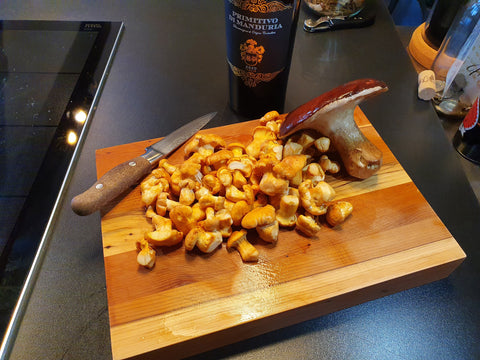The yew wood - uniquely different!

Yew wood usually has very clear, fine, dark growth rings, which come into their own on your light orange-red to dark red-violet wood! The yew is the only native conifer that does not contain resin either in its wood or in its bark. It is by far the hardest, most durable, most flexible and also the heaviest European softwood. The properties are so diverse and special that even today it still has a magical effect on you! The wood, which is very heavy and tough in its "core" and at the same time very elastic in the yellow-whitish "sapwood", was particularly suitable as a "bow wood". When processed, it is comparatively hard and tough and therefore demanding for people, tools and machines. It is often very wild and not homogeneously grown, knotty wood, which can make processing even more difficult. When drying, it shrinks and swells only slightly and is therefore still popular with experienced wood turners and carvers.


Furthermore, it is extremely durable due to the tanning agents it contains. It weathers slowly and is therefore still used today as "pergola wood" or as "pile wood". Untreated, it lasts for over 15 years, depending on the location. If you use peeled, slow-growing trunks, which mostly consist of heartwood, even 25 years are possible. This puts the yew in the same class as oak, robinia or teak wood in terms of durability!
Eiben-Art products such as cutting and serving boards made of yew wood will give you and us pleasure for a long time!

Here is a comparison of the raw density of some types of wood:
wood type |
Density in kg/m³ |
|---|---|
Black Locust |
770 |
Oak |
770 |
beech |
720 |
yew |
670 |
teak |
660 |
European larch |
590 |
Mahogany |
510 |
douglas fir |
510 |
pine |
550 |
Spruce |
470 |
silver fir |
450 |
poplar |
450 |
Care should be taken when working with yew wood due to the taxine it contains. Wood dust from the yew tree can cause headaches and irritation of the mucous membranes, as well as allergic reactions such as B cause asthma attacks. The susceptibility to this is very individual, so there are also people who do not react at all when they come into contact with it. However, to be on the safe side, it is advisable to wear a breathing mask, gloves and safety goggles for all work. Incidentally, it is best to wear a breathing mask for all wood milling and grinding work, because fine wood dust is generally not good for our lungs!
The use of yew wood for the production of drinking cups, tableware such as e.g. B Spoons, plates and other objects that are inserted orally, or used as containers for food and drink!!!

Ich dachte die Eibe sei geschützt…?